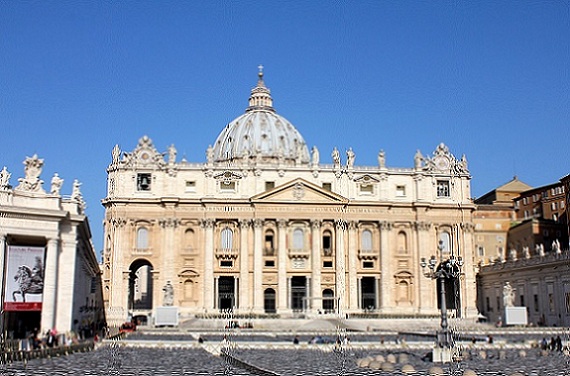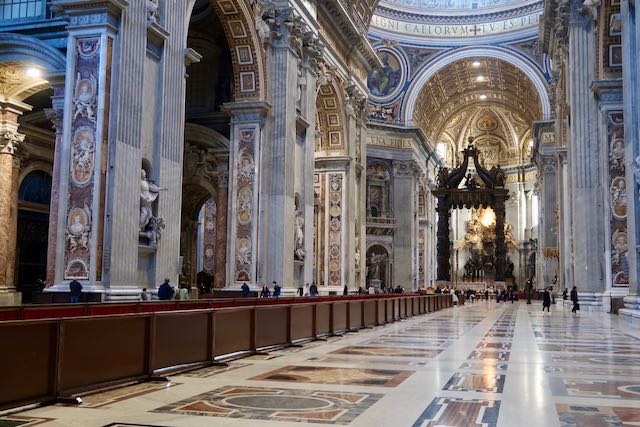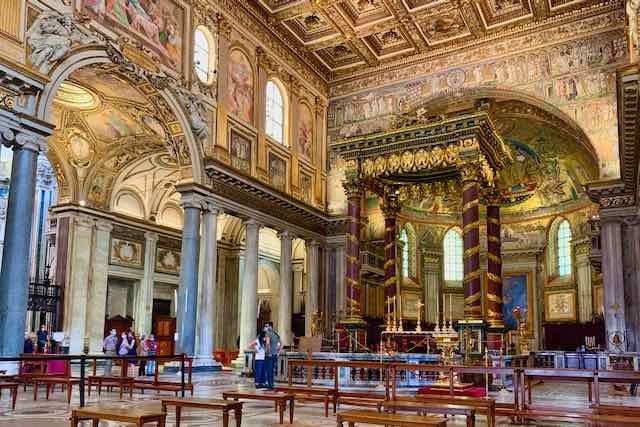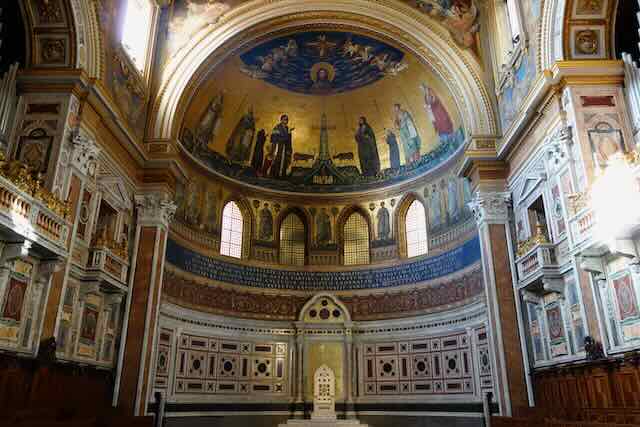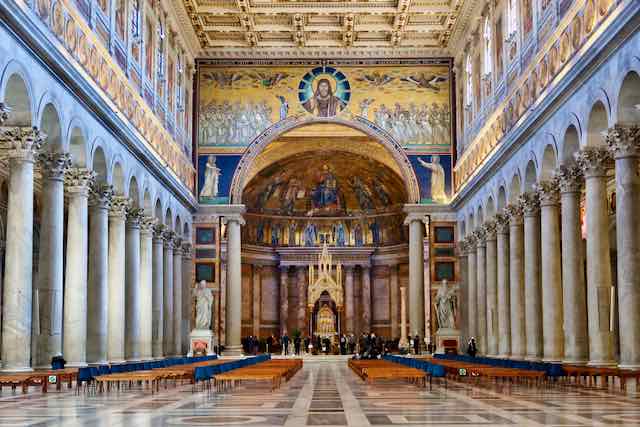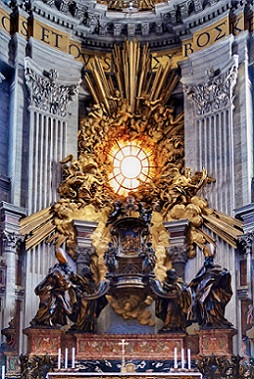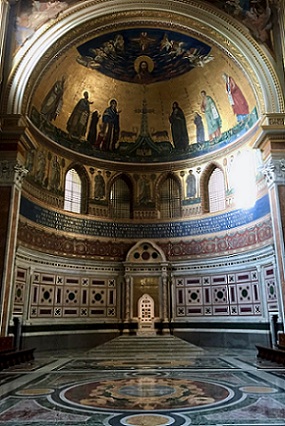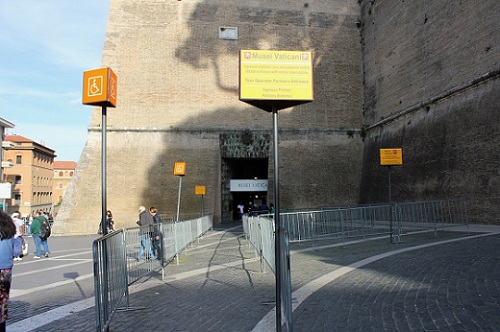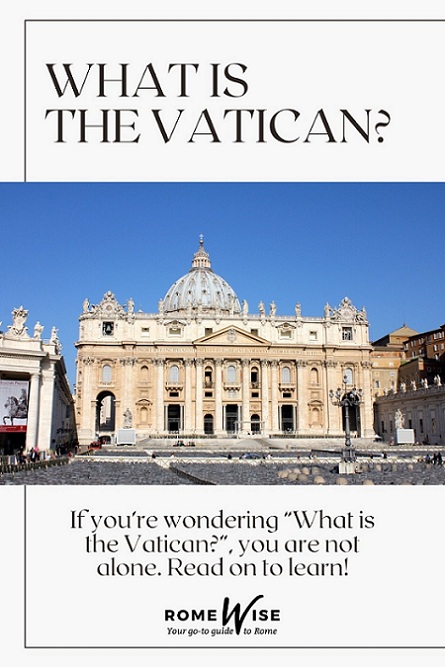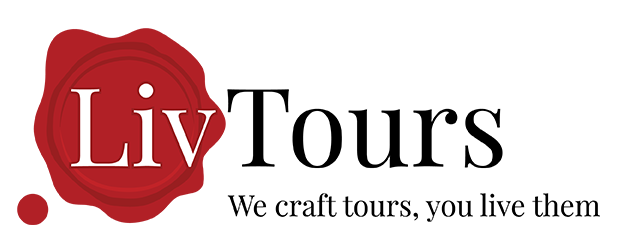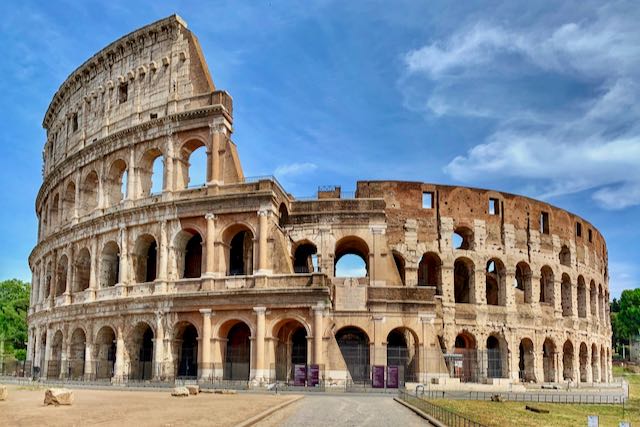- Sign up & get a FREE ebook Subscribe NOW!
- Romewise Home Page
- Visiting the Vatican
- What Is the Vatican
What is the Vatican? - Discover the meaning behind this unique territory!
So, exactly what is the Vatican?
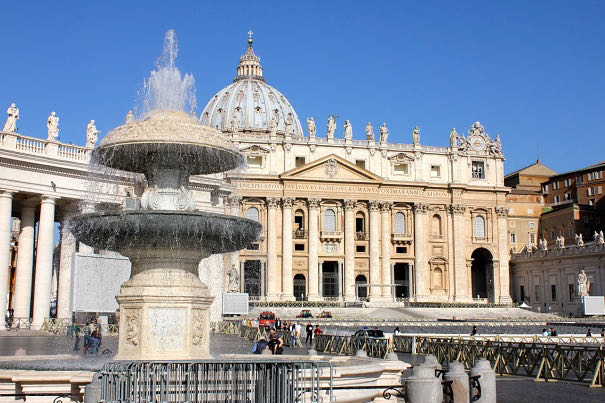 Saint Peter's basilica is part of Vatican City. The pope is head of state of Vatican City, the smallest sovereign nation in the world.
Saint Peter's basilica is part of Vatican City. The pope is head of state of Vatican City, the smallest sovereign nation in the world.When you hear this word, do you think of the Pope?
Saint Peter’s Basilica?
The combo of St. Peter’s Basilica, St. Peter’s Square, and the Vatican Museums?
The Holy See?
(wondering what this means? Read on!)
Wondering how to visit Vatican City?
We’ll go over that too!
What is the Vatican – Everything you need to know
One of our favorite movie lines is from Analyze This, when Billy Crystal and Lisa Kudrow’s characters arrive home to find a large baroque fountain in their front yard, presumably a gift from their mafia boss friend played by Robert De Niro.
Billy Crystal deadpans “Call the Vatican. See if something's missing.”
It had us in stitches.

But seriously, who would you call?
If you’re wondering “What is the Vatican?”, you are not alone.
Here are some quick facts about What is the Vatican, the Holy See, and Vatican City.
- Is Vatican City a country? What’s the capital?
- Where is the Vatican located? Is the Vatican in Rome? Is Vatican City in Italy?
- How old is the Vatican City state?
- Who lives in the Vatican?
- What’s inside the Vatican?
- What is the Holy See? What is the difference between the Holy See, the Vatican, Vatican City, and the Pope?
Want to know when the Vatican was built and who built it?
Here's what you need to know about visiting the Vatican:
- Do you need a passport to visit Vatican City? Can you have Vatican citizenship?
- How can you enter Vatican City?
- Do you need tickets to visit Vatican City?
- What is the Vatican City dress code?
What is the Vatican City? What is the Vatican location? How big is it?
Vatican City is a sovereign city-state inside Rome in central Italy.
It occupies 49 hectares (121 acres) and has a population of around 800-900 people.
In both size/area and population, Vatican City is the smallest sovereign state in the world.
There is no capital of Vatican City as the city is the state itself.
Take a look at Vatican City on a world map.
(It opens in a new Google maps window. You can zoom out.)
Is Vatican City a country?
Not really.
A more correct term is city-state.
The entire city of Vatican City encompasses the state itself, so it’s a state made up of one large city.
Vatican City is not a democracy and is not a member of the United Nations.
It is not a member of the EU although the official currency is the Euro.
Euro coins representing the Vatican are printed at the mint in Rome.
Pope Francis is the current Bishop of Rome and is head of state of Vatican City.
The Pope is not considered a king although he is the sovereign ruler of both Vatican City and of the Holy See.
When was the Vatican established?
Vatican City was created on February 11, 1929 as part of the Lateran Accords between the Roman Catholic Church and the Fascist regime of Benito Mussolini.
As for the founding of St. Peter’s Basilica and the timeline of the papacy, these are all on my page, A Brief History of the Vatican.
Ready to plan your trip?
Book your train
Planning to travel between cities in Italy and other parts of Europe?
Use Trainline to see all the different options available across the different rail companies.
Find your hotel
Find your perfect place to stay in Rome.
Use Booking.com to choose between hotels, guesthouses, and self-catering apartments in neighborhoods throughout the Eternal City.
Buy your TurboPass
Purchase the convenient Turbopass and visit all of Rome's top attractions including the Colosseum, Pantheon, and Vatican.
With one handy pass, it's all included.
What is official language of Vatican City?
The official language of Vatican City state is Italian.
Sort of.
Since the Vatican is inside Italy, you could say that Italian is the official language.
However, it’s actually more complicated than that.
First of all, you have the Pope, who may not be Italian and whose native language is something else.
For example, Pope Francis is Argentinian so his native language is Spanish, although he does, of course, speak Italian.
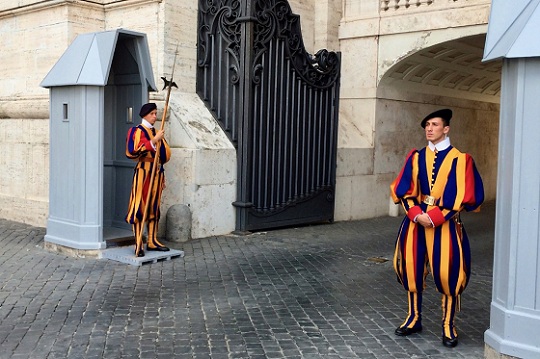 What is the Vatican City official language? It might depend on who you ask. The Swiss Guard are residents of Vatican City, and come from Switzerland, where there are 4 official languages - Italian, French, German, and Romansch. Most residents of Vatican City do speak Italian.
What is the Vatican City official language? It might depend on who you ask. The Swiss Guard are residents of Vatican City, and come from Switzerland, where there are 4 official languages - Italian, French, German, and Romansch. Most residents of Vatican City do speak Italian.Then you have the Swiss Guard.
The Swiss Guard are indeed Swiss.
And in Switzerland, there are 4 official languages, and the guards may speak any one or even several of these – French, German, Italian, and Romansch.
When they are sworn in each year on May 6, they take the oath in whatever their mother tongue is.
Most workers in the Vatican are Italian and so Italian is the most widely-spoken language in Vatican City.
But you will also be fine speaking English, as many staff speak at least a little English, enough to assist the millions of pilgrims and tourists that visit each year.
Jump start your trip to Rome with a free ebook 😀
Sign-up to our free newsletter and receive our Quick Start Guide to Rome ebook which share's everything you need to know to plan the perfect trip to the Eternal City 🙌
Who lives in the Vatican? Where does the Pope reside?
What is the Vatican population?
Generally fewer than 1,000 people live in Vatican City.
This includes the Pope and his staff, some clergy, members of the Swiss Guard and their families if they are married, and a few others working in or for the Church.
The majority of Vatican citizens are men.
You can have Vatican City citizenship with a passport but these are naturally very limited.
 From Saint Peter's dome, you can see parts of Vatican City, like Casa Santa Marta, where Pope Francis lives.
From Saint Peter's dome, you can see parts of Vatican City, like Casa Santa Marta, where Pope Francis lives.Until recently, popes have resided in the Apostolic Palace.
Pope Francis said he thought this was more than he needed, so he resides instead in Casa Santa Marta, another building in Vatican City, just behind Saint Peter’s Basilica.
There is also the Papal summer residence at Castel Gandolfo, but Pope Francis has not used this so far.
What is the Vatican interior like? What’s inside the Vatican?
Vatican City contains various religious and cultural sites of the Catholic Church but also some facilities that are essential for daily life.
There are local churches, a grocery, a pharmacy, a post office, a press office, a radio station, banks, and condo buildings, many of which are assigned to the Swiss Guards and their families.
You cannot visit any of these if you are not a resident of Vatican City.
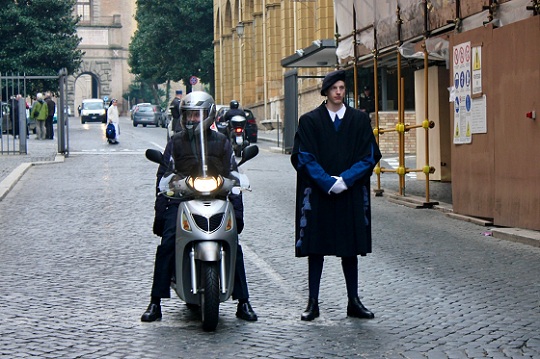 There are parts of Vatican City that are only accessible to residents and some visitors (press, friends of residents, clergy, etc.)
There are parts of Vatican City that are only accessible to residents and some visitors (press, friends of residents, clergy, etc.)Some of the more famous buildings inside Vatican City include St. Peter’s Basilica, the Apostolic Palace (where the Pope normally lives), the Vatican Museums, and the Vatican Gardens.
You can visit these places as a tourist.
Given the massive amount of art inside the Vatican, you can understand why Vatican City was declared a Unesco World Heritage Site in 1984.
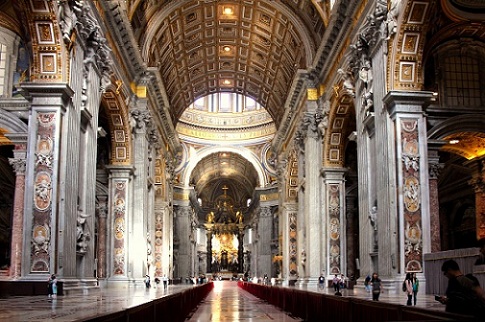 What is the Vatican interior? If you are referring to the Basilica, there is a wealth of art, but you can visit most of it as a tourist.
What is the Vatican interior? If you are referring to the Basilica, there is a wealth of art, but you can visit most of it as a tourist.What is the Holy See? What is the difference between the Holy See, Vatican City, and the Pope?
🇻🇦 Visit the Vatican 🇻🇦
Experience the best of the Vatican.
Enjoy easy access to the Vatican Museums, Sistine Chapel,
and St. Peter’s Basilica for an unforgettable experience
with these recommended tours.
The term “Holy See” comes from Latin “Sancta Sedes”, which means “Holy Chair.”
The term was coined in the 1st century and refers to the enthronement ceremony of the pope.
This raised papal chair is also called a cathedra, and it’s meant to symbolize the power of the Church, not of the pope himself.
The four major (papal) basilicas
The phrase “Holy See” does not refer to a specific person (Pope or other members of the Curia) or to a geographic area (Vatican City).
The Holy See is the entity that governs both the actual territory of Vatican City and the entirety of Roman Catholicism around the world, which includes some 1.2 billion followers.
 Pope Francis on Easter Sunday, delivering the Urbi et Orbi. The Pope is the Bishop of Rome, and head of state of Vatican City.
Pope Francis on Easter Sunday, delivering the Urbi et Orbi. The Pope is the Bishop of Rome, and head of state of Vatican City.The person at the head of this governing body is the Pope, also known as the Bishop of Rome.
Other high-ranking clergy of various nationalities make up the Curia, who are the administrators of the Holy See.
Until 1929, the Holy See had both spiritual and secular sovereignty.
When Italy became a unified country in 1846, the Papal States were dissolved.
The Pope declared himself prisoner of the Vatican and did not leave the territory until Pope Pius IX signed the Lateran treaty with the Fascist regime in 1929.
By doing so, the pope gave up all claims to temporal leadership but was given complete authority to oversee religious matters.
As to the more complex questions such as how old is the Vatican and who built it, we’ll need to dive back to Ancient Rome, where it all began.
Come on over to my page all about this.
The perfect 3-day itinerary in Rome
Trying to figure out how to organize your visit to Rome? I've got the perfect 3-day itinerary for first-time visitors (or those who have not been here in a while.) It works for a 2.5 day visit as well.
In my 3-day itinerary, you'll see all the major must-see Rome attractions like the Vatican, Colosseum, Trevi Fountain, Pantheon, Piazza Navona, Spanish Steps, and much more.
And if you have more time, or want suggestions for extra/other things to do, you'll find that there too.
Visit my page with the best 3-day itinerary in Rome for first-timers.
What is the Vatican as a tourist site? How to visit the Vatican?
Do you need a passport to visit Vatican City?
No.
You don’t need a passport to visit the Vatican.
In fact, I always suggest you leave your passport back in your hotel room or apartment, and go around with a photocopy.
This will prevent your passport getting lost or stolen, which is a huge headache.
Enjoy entry to Rome’s historic sites, such as St. Peter’s Basilica, the Vatican Museums, and the Colosseum, with a 3-day combined city pass.
How can you enter Vatican City? What are the Vatican walls?
Yes, there are walls all around Vatican City.
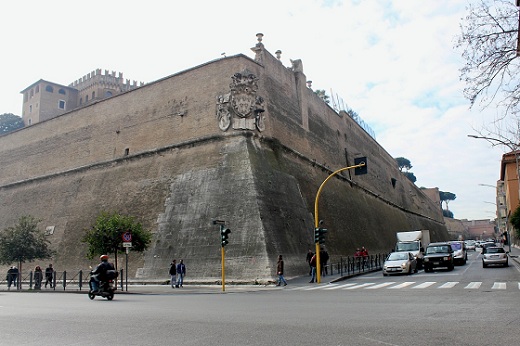 What is the Vatican wall for? The walls were made over centuries to protect the Vatican and the pope but today they are simply part of its history, and not intended in any way to keep people out.
What is the Vatican wall for? The walls were made over centuries to protect the Vatican and the pope but today they are simply part of its history, and not intended in any way to keep people out.But they are there because they were built and extended across multiple centuries, beginning in the 7th century.
None of the walls around the Vatican are there to keep you out, per se.
On the other hand, there are only 6 ways to enter Vatican City.
Three of these are open to the public.
Disclosure: If you make a purchase through a link on this page, I may receive a small commission - at no extra cost to you. Thank you for supporting my site!
 Where's the Vatican entrance? One of the three, where you can easily access Vatican City from Italy, is right in front. Cross from Italy into Saint Peter's Square just by walking onto it. You're in!
Where's the Vatican entrance? One of the three, where you can easily access Vatican City from Italy, is right in front. Cross from Italy into Saint Peter's Square just by walking onto it. You're in!- St. Peter’s Square – this is also the entry to the basilica and the dome
- Vatican Museums – this is also the entry to the Vatican Gardens
- Swiss Guard entrance for visiting St. Peter’s tomb – when you finish your tour, you will be inside the basilica of St Peter
 This entrance to the left of Saint Peter's Basilica and Bernini's colonnade is where you can enter Vatican City when you visit Saint Peter's tomb. You must show the Swiss Guard your reservation, and you're in!
This entrance to the left of Saint Peter's Basilica and Bernini's colonnade is where you can enter Vatican City when you visit Saint Peter's tomb. You must show the Swiss Guard your reservation, and you're in!Do you need tickets to enter Vatican City?
Because Vatican City is made up of several buildings and sites that are accessible to tourists, the answer to this is yes and no.
You need tickets to enter these Vatican sites:
You also need tickets (which are free) to attend a papal mass or a papal audience, whether in St. Peter’s Square, inside the basilica, or in the Paul VI Audience Hall.
This is especially the case for big events like Easter or Christmas.
You do not need tickets to enter:
What is the Vatican City dress code?
This one really confused me for a long time.
I always knew you had to show up at the Vatican Museums properly dressed or you would not be allowed in.
As I would walk through the museums in hot weather, I saw so many scantily-clad people with bare shoulders.
I asked a Vatican guard about this and he told me that the important thing is to be properly covered up to enter the Sistine Chapel, and that the rest of the museums are not considered a holy place.
I guess that makes sense.
This is also a multi-part answer.
Before we go any further, let me remind you of my number one rule for sight-seeing anywhere in Rome – Be comfortable.
Wear comfortable shoes and clothing.
And don’t forget to be comfortable.
(Did that sink in?)
As for visiting any Christian or holy site in Rome, including any other churches, the catacombs, or even other religious properties like a synagogue or mosque, you should have shoulders, knees, and midriffs covered.
This is about modesty, not being fancy.
You may wear jeans, sandals, t-shirts if you like.
No matter what season you visit Rome, here are 4 essential things we recommend never leaving home without:
Does this mean you have to be all bundled up and melting in summer when you visit the Vatican?
Only when you go inside certain holy sites.
When you are inside Saint Peter’s Basilica, Saint Peter’s tomb, the Vatican Gardens, and the Sistine Chapel, you must be modestly dressed.
You do not need to cover up when you visit St. Peter’s Square, climb Saint Peter’s dome, or when you walk through most of the Vatican Museums.
When you visit the Vatican Museums, you must show at the entrance that you have modest dress, but then as you walk through the museums, you can uncover your shoulders.
The Sistine Chapel is at the very end of your visit to the Vatican Museums.
Before entering, you’ll have to cover back up.
Covering your knees and shoulders is not required to climb Saint Peter’s dome, but when you come down from the dome, you pop out inside St. Peter’s Basilica and then you will have to cover up.
Visit my page here with complete details for what to pack for Rome for all seasons.
Romewise's Top Travel Resources
Ready to book your trip to Rome? Take a look at these helpful links to companies we use and trust:
- Keep your travel spending simple with the Wise card, which removes all the worry about exchange rates and high transaction fees all over the world
- Search for and book your perfect accommodation
- Our complete guide to what to pack for Rome
- The number one travel accessory, a multi-point travel adapter and voltage converter
- Browse a huge range of tours in Rome and beyond
- Experience unique tours and special access to Rome's most popular sights
- Protect yourself with comprehensive travel insurance
Within this post there are some affiliate links for products and services. For more details about our affiliate policy click here.
Get your 100% free Rome trip planner now!
Simply sign-up today for our free newsletter and get the Romewise Quick Start guide to Rome:
We are committed to respecting your data. Click for our Privacy Policy.
Comments? Questions? Suggestions?
Please come over to the private Romewise Facebook group and join in the conversation.
You will often find me there, happy to answer your questions / comments!
You will also meet other Rome lovers and experts, too.
What are you waiting for?
- Romewise Home Page
- Visiting the Vatican
- What Is the Vatican


